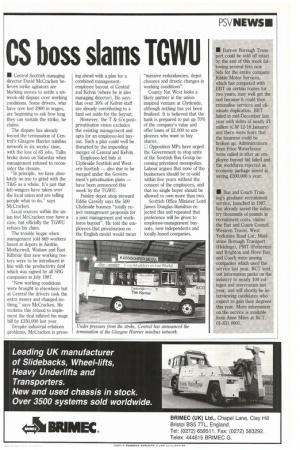CS boss slams TGWU
Page 17

If you've noticed an error in this article please click here to report it so we can fix it.
• Central Scottish managing director David McCracken believes strike agitators are blocking moves to settle a sixweek-old dispute over working conditions. Some drivers, who have now lost £900 in wages, are beginning to ask how long they can sustain the strike, he claims.
The dispute has already forced the termination of Central's Glasgow Harrier minibus network in six weeks' time, with the loss of 65 jobs. Talks broke down on Saturday when management refused to reconsider the closure.
In principle, we have absolutely no axe to grind with the T&G as a whole. It's just that left-wingers have taken over the local union and are telling people what to do," says McCracken.
Local sources within the union feel McCracken may have a case, but officially the TGWU refutes his claim.
The trouble began when management told 869 workers based at depots in Airdrie, Motherwell, Wishaw and East Kilbride that new working rosters were to be introduced in line, with the productivity deal which was signed by all SBG companies in July 1987.
"New working conditions were brought in elsewhere but at Central the drivers took the extra money and changed nothing," says McCracken. He reckons this refusal to implement the deal inflated his wage bill by £350,000 last year.
Despite industrial relations problems, McCracken is press ing ahead with a plan for a combined managementemployee buyout of Central and Kelvin (where he is also managing director). He says that over 30% of Kelvin staff are already contributing to a fund set aside for the buyout.
However, the T & G's postprivatisation vision excludes the existing management and opts for an employee-led buyout. Such a plan could well be thwarted by the impending merger of Central and Kelvin.
Employee-led bids at Clydeside Scottish and Western Scottish — also due to be merged under the Government's privatisation plans — have been announced this week by the TGWU.
Paisley depot shop steward Eddie Cassidy says the 500 Clydeside busmen "totally reject management proposals for a joint management and workforce buyout". He told the employees that privatisation on the English model would mean "massive redundancies, depot closures and drastic changes in working conditions".
County Nat West looks a likely partner in the unioninspired venture at Clydeside, although nothing has yet been finalised. It is believed that the bank is prepared to put up 70% of the company's value and offer loans of 22,000 to employees who want to buy shares.
E Opposition MPs have urged the Government to stop units of the Scottish Bus Group becoming privatised monopolies. Labour argues that none of the businesses should be re-sold within five years without the consent of the employees, and that no single buyer should be allowed to own more than two.
Scottish Office Minister Lord James Douglas-Hamilton rejected this and repeated that preference will be given to employee-management buyouts, new independents and locally-based companies.




















































































































